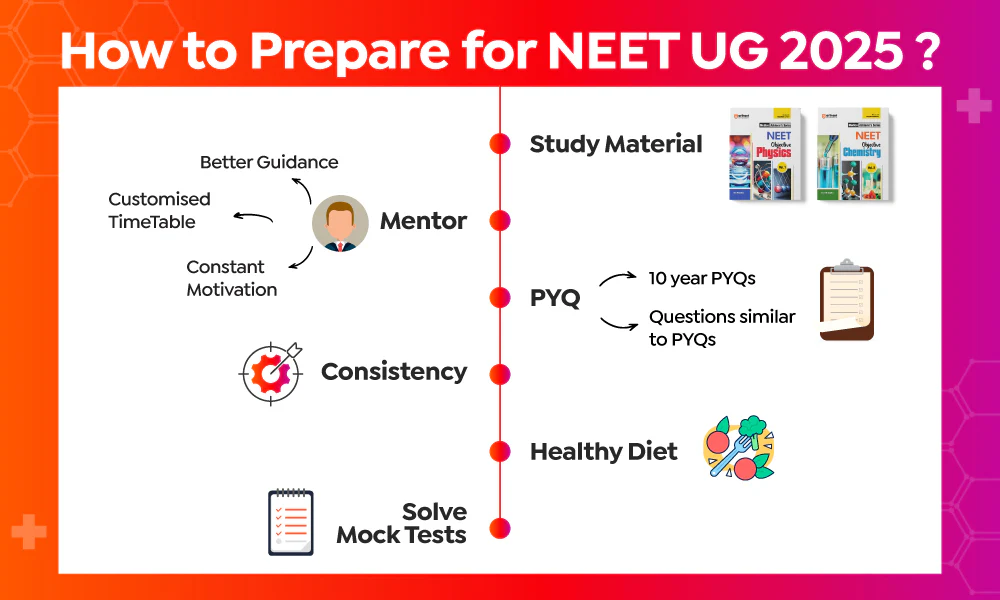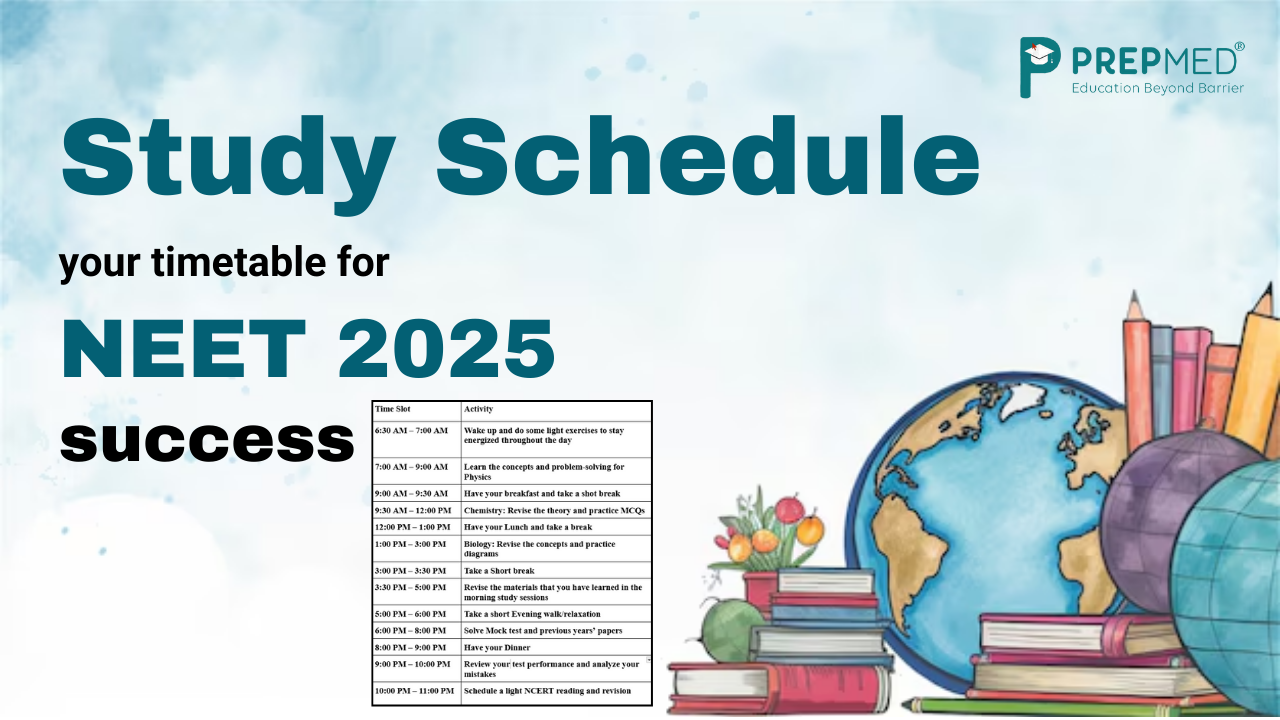January 29, 2025
Study Schedule your timetable for NEET 2025 success
Craft a perfect NEET 2025 preparation strategy that will guide you toward success in one of the most challenging and competitive exams in India. With the help of expert tips and suggestions, you will be able to stay consistent with your study routine effectively, ensuring that your study routine is aligned with the ultimate goal of excelling in the NEET 2025 exam.
Following this study routine will allow you to approach your studies and backlogs systematically, better grasping the main concepts, building your problem-solving ability and self-assurance. Know the importance of starting early, setting clear and achievable goals, strengthening your basics, and practicing mock tests and previous years' papers on a regular basis.
NOTE: Effective preparation requires maintaining consistency throughout the journey along with practicing efficient time management and maintaining a proper balance between study and relaxation. Expert-backed daily routine techniques will help you face the NEET exam with both precision and confidence. Working smart and staying focused along with strategic adjustments of your study approach will lead to NEET 2025 success because hard work alone does not guarantee success.
Preparation Strategy for NEET 2025 Success
-
Starting Early: NEET 2025 Prep Plan
The vast amount of NEET syllabus requires you to start your preparations well in advance. Your preparation study schedule for NEET should begin at least a year before the exam date. A long preparation time frame enables you to grasp fundamental concepts while practicing frequently and conducting rigorous revision sessions.
-
Defining Your Path to NEET 2025 Success
Set clear and achievable goals. Break down your vast syllabus of NEET 2025 into smaller, manageable targets. Your monthly goal should include both finishing specific chapters from your course material along with reaching designated mock exam scores.
-
Thorough understanding of the vast syllabus
Comprehending the NEET syllabus strictly sets the foundation for successful preparation. Detailed examination of the syllabus leads you to identify the high-weightage topics. Arrange your study material according to subjects and weightage in the upcoming NEET 2025 test.
Fundamentals which are strong serve as the essential element for NEET success. Create a strong base in Physics Chemistry Biology through focused learning. Make sure you understand the basic concepts before moving on to more complex topics.
-
Maintain regular practice sessions
The key to mastering NEET concepts is practicing regularly. Incorporate solving a variety of questions into your timetable, including multiple-choice questions (MCQs), assertion-reasoning questions, and previous years’ papers. Through regular practice, your problem-solving proficiency improves while your speed increases with better accuracy.
-
Practice mock tests and previous year's papers
Solving mock tests and previous years' papers proves significant for your NEET 2025 preparation. Mock tests performed regularly serve as the most powerful preparation tool for NEET assessment. Mock tests give you the prior experience of the real exam conditions while revealing where you excel and where you need improvement and enhance your time management abilities. By working through past year papers you will understand the format of the exam as well as the type of questions that are frequently asked.
-
Keep yourself healthy and stay calm
The process of preparation depends extensively on maintaining the proper state of both your physical and mental well-being. A healthy lifestyle includes both sufficient sleep and regular exercise along with a balanced diet. Keep yourself motivated through setting reachable goals and giving yourself prizes when you reach them.
The ultimate NEET 2025 study plan

Effective preparation depends on developing a regular everyday study schedule. Here’s a sample daily study plan:
- Morning : During the morning session from 6:00 AM to 9:00 AM it is important to review previous day's content while practicing MCQs.
- Mid-Morning : The morning duration from 10 AM to 1 PM, focus your concentration on Physics/Chemistry topics together with problem-solving followed by doubt-clearing sessions.
- Afternoon : Devote the time period between 2:00 PM to 5:00 PM to Biology, make conceptual and detailed notes and diagrams.
- Evening: From 6 PM to 9 PM, allocate time for reviewing incorrect responses along with solving brief quizzes and working on weak areas.
- Night: During the time period between 10:00 PM to 11:00 PM, focus on reading NCERT textbooks and reviewing essential formulas.
Devote particular subjects to specific week days. For example:
- Monday & Tuesday: Chemistry
- Wednesday & Thursday: Physics
- Friday & Saturday: Biology
- Sunday: Revision and mock tests
Through this approach, you will be able to maintain a consistent focus on each subject while ensuring multiple revision sessions which will help you retain information effectively.
Your monthly targets should match the number of chapters or topics you want to study every month. Organize your academic plan so that you finish core subject content first then advance to complex concepts in subsequent months. The organized method enables a systematic coverage of the syllabus effectively.
In order to retain information and improve recall during the exam, creating a balanced revision schedule is important. Create a revision plan that includes daily, weekly, and monthly revisions. You can improve your revision effectiveness using three key techniques: flashcards along with summary notes as well as mind maps.
NEET 2025 Study Plan: A Sample Timetable for Effective Preparation
Here’s a sample timetable that you can adjust according to your individual preferences and study routine:
|
Time Slot
|
Activity
|
|
6:30 AM – 7:00 AM
|
Wake up and do some light exercises to stay energized throughout the day
|
|
7:00 AM – 9:00 AM
|
Learn the concepts and problem-solving for Physics
|
|
9:00 AM – 9:30 AM
|
Have your breakfast and take a shot break
|
|
9:30 AM – 12:00 PM
|
Chemistry: Revise the theory and practice MCQs
|
|
12:00 PM – 1:00 PM
|
Have your Lunch and take a break
|
|
1:00 PM – 3:00 PM
|
Biology: Revise the concepts and practice diagrams
|
|
3:00 PM – 3:30 PM
|
Take a Short break
|
|
3:30 PM – 5:00 PM
|
Revise the materials that you have learned in the morning study sessions
|
|
5:00 PM – 6:00 PM
|
Take a short Evening walk/relaxation
|
|
6:00 PM – 8:00 PM
|
Solve Mock test and previous years’ papers
|
|
8:00 PM – 9:00 PM
|
Have your Dinner
|
|
9:00 PM – 10:00 PM
|
Review your test performance and analyze your mistakes
|
|
10:00 PM – 11:00 PM
|
Schedule a light NCERT reading and revision
|
Create your timetable based on your preferred study approach while considering your strong basics and the concepts which require improvements. Customize it by:
- The time allocation will increase for subjects that need additional focus.
- Incorporating breaks to avoid burnout.
- Structure your study time based on your most productive study hours which could be either daytime or nighttime.
FAQS:
1. What approach should I follow to incorporate scheduled breaks and protect against burnout during my NEET preparation?
Schedule short breaks (5-10 minutes) after each study session and longer breaks (30-60 minutes) after 2-3 hours of study. During these breaks take time to relax your body through stretching or going for a walk and keep yourself hydrated. To prevent burnout, you need to maintain enough sleep at night. Incorporate recreational activities like spending time with friends along with exercise and music listening.
2. How many daily hours do students need for successful NEET preparation?
An effective daily study duration should typically range between 6 to 8 hours according to expert’s recommendations. If you're preparing full-time, you may want to study for 8-10 hours, but ensure that you also take adequate breaks to avoid burnout.
3. Is following a rigid study schedule important or can I adopt a flexible approach?
A structured timetable remains important but students must also establish flexible study methods. Several uncertainties often force you to modify your academic schedule or change study content as needed. Stay consistent and ensure that you cover every subject over a stipulated period of time.






